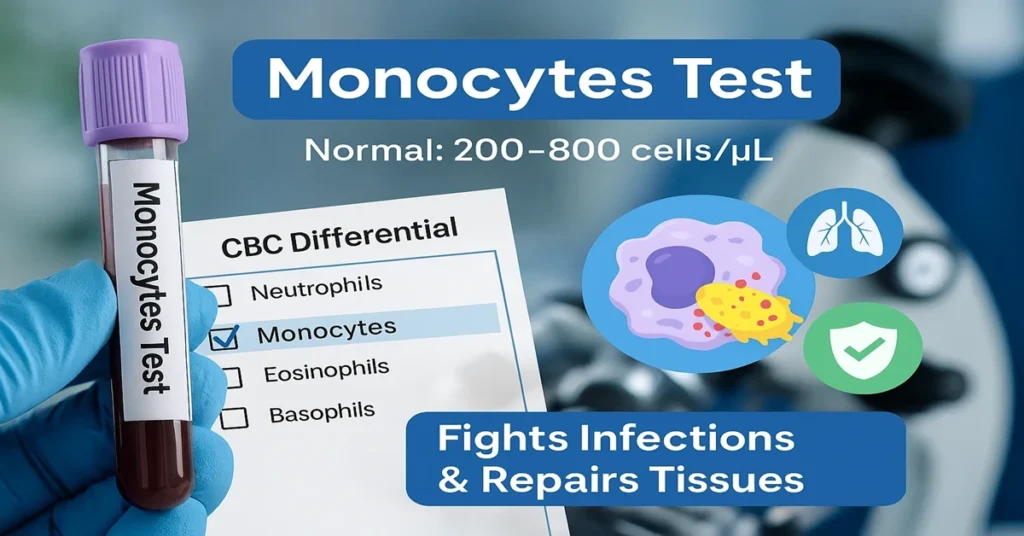What are Monocytes?
Monocytes are a type of white blood cell (WBC) that play a major role in the immune defense system. They are the largest WBCs and belong to the agranulocyte group. Monocytes circulate in the blood and later move into tissues, where they mature into macrophages or dendritic cells. These cells help fight infections, remove damaged cells, and support tissue repair.
Where are Monocytes Produced in the Body?
Monocytes are produced in the bone marrow from stem cells. Once released into the bloodstream, they circulate for about 1–3 days before entering tissues such as the liver, spleen, lungs, and lymph nodes, where they continue their work as macrophages or dendritic cells.
Main Functions and Importance
- Phagocytosis: Monocytes engulf and digest bacteria, dead cells, and waste.
- Immune Activation: Act as antigen-presenting cells (APCs) to alert and activate other immune cells.
- Mature into Macrophages & Dendritic Cells: Provide long-term immune defense in tissues.
- Tissue Repair: Assist in wound healing and recovery.
- Immune Regulation: Release cytokines to control inflammation and immune balance.
Causes of Low Monocyte Levels (Monocytopenia)
- Bone marrow suppression (chemotherapy, radiation, infections)
- Aplastic anemia
- Severe infections or sepsis (immune exhaustion)
- Corticosteroid use
- Immunodeficiency disorders (e.g., HIV/AIDS)
Symptoms of Low Monocytes
Low monocytes usually don’t cause direct symptoms but may be linked with:
- Recurrent or frequent infections
- Slow healing of wounds
- Fatigue or weakness (if part of a larger immune or blood disorder)
Causes of High Monocyte Levels (Monocytosis)
- Chronic infections: tuberculosis, syphilis
- Autoimmune disorders: lupus, rheumatoid arthritis
- Blood cancers: chronic myelomonocytic leukemia (CMML)
- Recovery phase after infection or chemotherapy
- Inflammatory bowel disease (IBD)
- Sarcoidosis (chronic inflammatory condition)
Symptoms of High Monocytes
High monocytes themselves may not cause symptoms but can indicate underlying conditions:
- Fever, weight loss, or night sweats (chronic infections or cancer)
- Ongoing inflammation
- Joint pain and stiffness (autoimmune diseases)
- Swollen lymph nodes or spleen (blood cancers or infections)
Reference Range
(may vary slightly by lab)
- Absolute Monocyte Count: 200 – 800 cells/µL
- Percentage of Total WBCs: 2% – 8%
Sample Type
- Sample: Whole blood
- Tube Used: Lavender-top EDTA tube
Test Preparation
- No fasting is usually needed.
- Inform doctor about medicines like steroids, chemotherapy, or immunosuppressants.
- Stay hydrated before the test.
When to Consult a Doctor
- If your CBC shows consistently high or low monocytes.
- If you have repeated infections or delayed healing.
- If you experience unexplained fever, weight loss, or swollen glands.
- If you have a family history of autoimmune disorders or blood cancers.
Key Terms Explained
- Monocytes: Largest type of WBC that fights infections and repairs tissues.
- Monocytosis: High monocyte count.
- Monocytopenia: Low monocyte count.
- Macrophages: Mature monocytes in tissues that digest germs and debris.
- Dendritic cells: Monocyte-derived cells that activate other immune cells.
- CBC with Differential: Blood test that shows types and percentages of WBCs.
~END~

